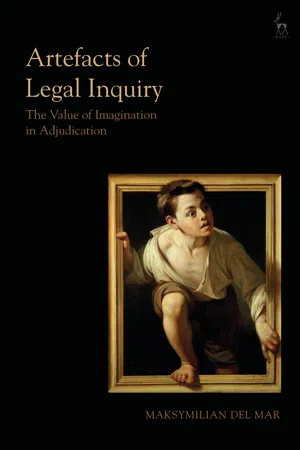
- 400 pages
- English
- PDF
- Available on iOS & Android
About this book
Winner of the 2022 Commendation for Excellence by the International Association for Legal and Social Philosophy (IVR). What is the value of fictions, metaphors, figures and scenarios in adjudication? This book develops three models to help answer that question: inquiry, artefacts and imagination. Legal language, it is argued, contains artefacts – forms that signal their own artifice and call upon us to do things with them. To imagine, in turn, is to enter a distinctive epistemic frame where we temporarily suspend certain epistemic norms and commitments and participate actively along a spectrum of affective, sensory and kinesic involvement. The book argues that artefacts and related processes of imagination are valuable insofar as they enable inquiry in adjudication, ie the social (interactive and collective) process of making insight into what values, vulnerabilities and interests might be at stake in a case and in similar cases in the future. Artefacts of Legal Inquiry is structured in two parts, with the first offering an account of the three models of inquiry, artefacts and imagination, and the second examining four case studies (fictions, metaphors, figures and scenarios). Drawing on a broad range of theoretical traditions – including philosophy of imagination and emotion, the theory and history of rhetoric, and the cognitive humanities – this book offers an interdisciplinary defence of the importance of artefactual language and imagination in adjudication.
Frequently asked questions
- Essential is ideal for learners and professionals who enjoy exploring a wide range of subjects. Access the Essential Library with 800,000+ trusted titles and best-sellers across business, personal growth, and the humanities. Includes unlimited reading time and Standard Read Aloud voice.
- Complete: Perfect for advanced learners and researchers needing full, unrestricted access. Unlock 1.4M+ books across hundreds of subjects, including academic and specialized titles. The Complete Plan also includes advanced features like Premium Read Aloud and Research Assistant.
Please note we cannot support devices running on iOS 13 and Android 7 or earlier. Learn more about using the app.
Information
Table of contents
- Acknowledgements
- Contents
- Introduction
- PART I: MODELS
- PART II: CASE STUDIES
- Conclusion
- Bibliography
- Index